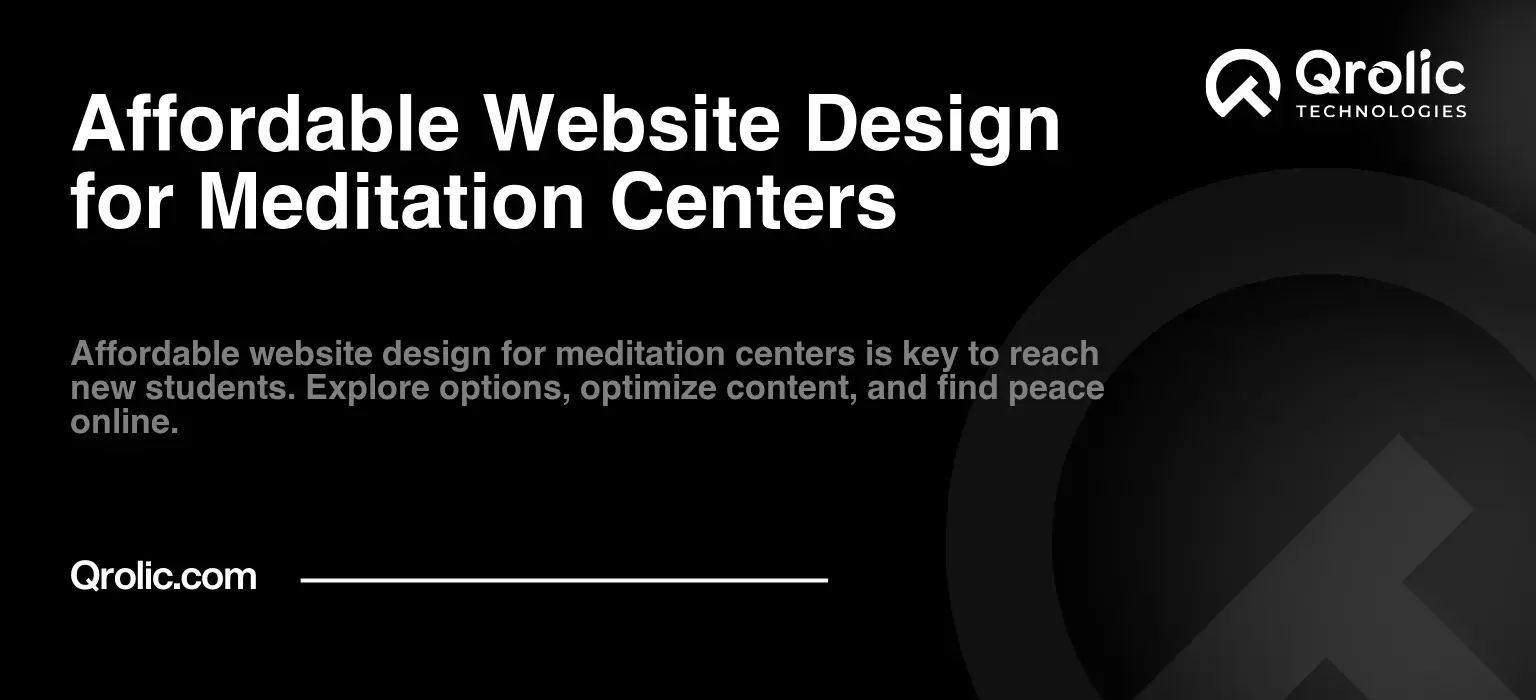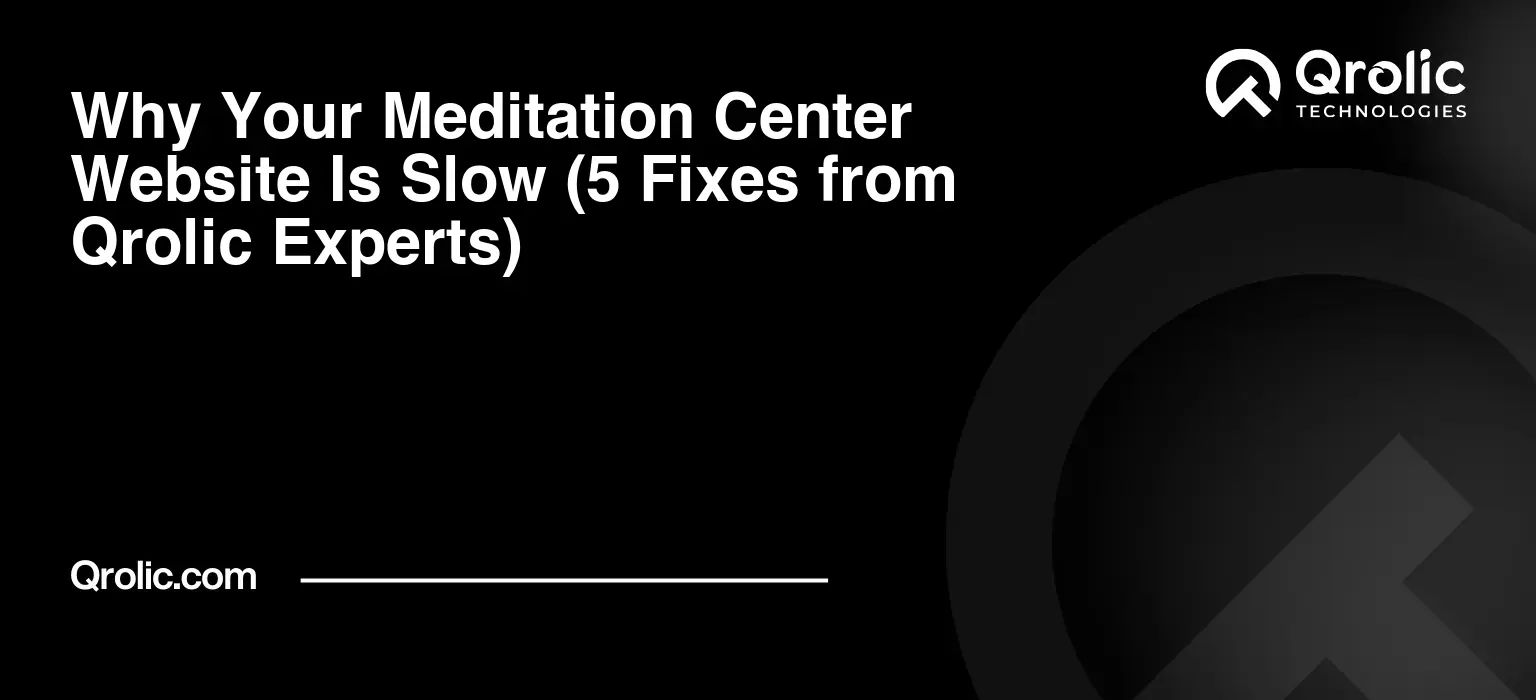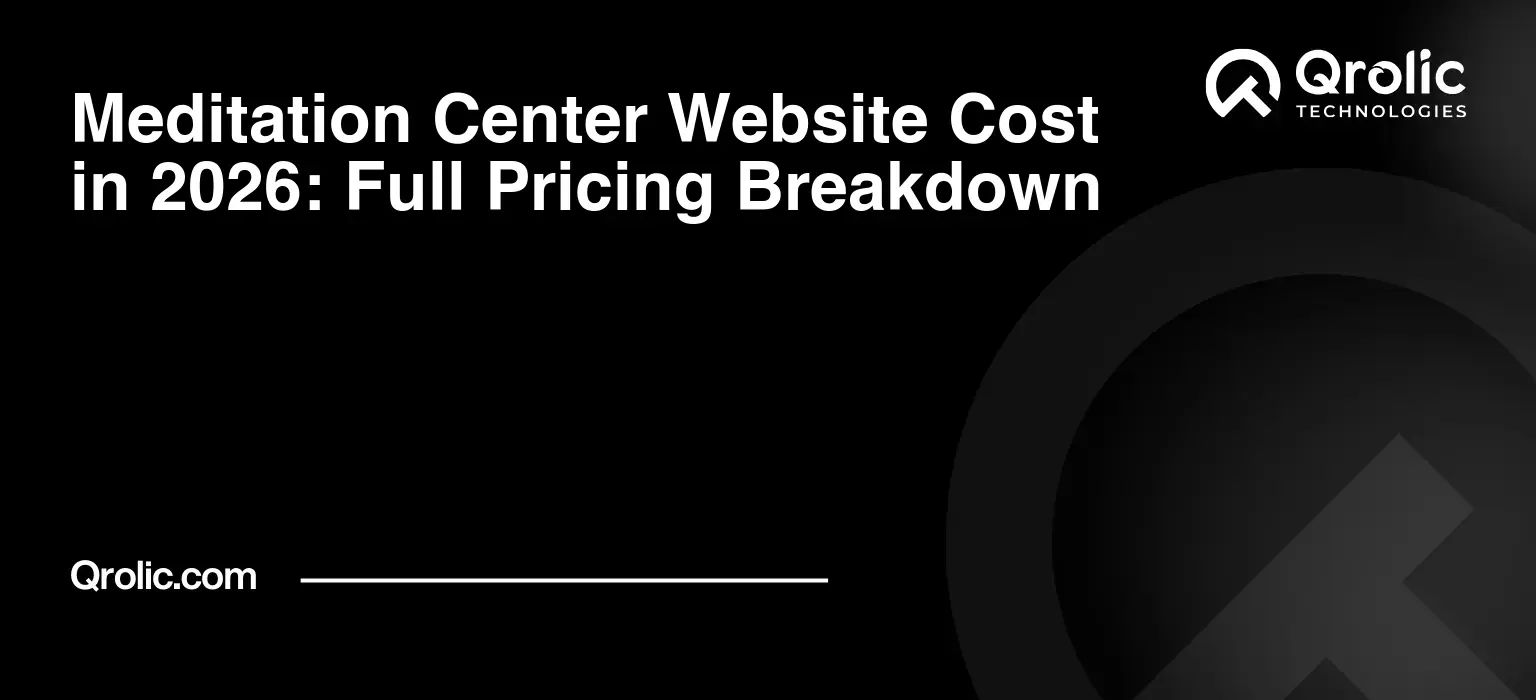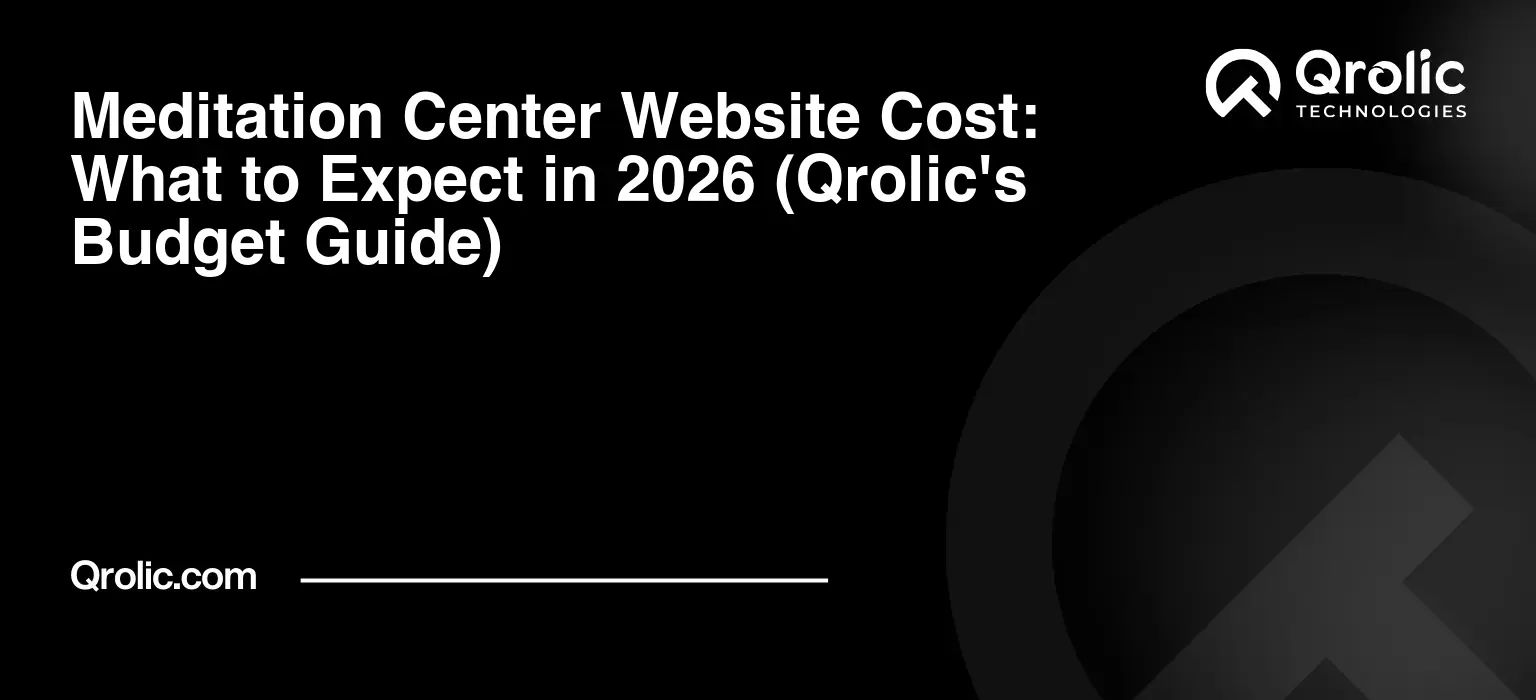In today’s digitally driven world, a strong online presence is no longer a luxury, but a necessity for any organization, including meditation centers. Your website is often the first point of contact for potential students seeking solace, mindfulness, and inner peace. But the idea of building a website can feel overwhelming and expensive, especially for non-profits and small centers. This comprehensive guide is designed to help you navigate the world of affordable web design for meditation centers, ensuring your message of tranquility reaches a wider audience without breaking the bank.
Quick Summary:
- A website is crucial for your meditation center’s reach and credibility.
- Explore affordable options like DIY builders or flexible WordPress.
- Focus on clear design, helpful content, and search engine optimization.
- Start small and use free resources to build your site.
Table of Contents
- Why a Website is Crucial for Your Meditation Center
- 24/7 Information Hub
- Powerful Marketing Tool
- Credibility and Professionalism
- Understanding Affordable Web Design Options
- DIY Website Builders
- WordPress (Self-Hosted)
- Hiring a Freelance Web Designer
- Website Design Agencies
- Key Elements of an Effective Meditation Center Website
- Clear and Intuitive Navigation
- Visually Appealing Design
- Compelling Content
- Essential Information
- Call to Actions (CTAs)
- Optimizing Your Website for Search Engines (SEO)
- Keyword Research
- On-Page Optimization
- Off-Page Optimization
- Technical SEO
- Budget-Friendly Strategies
- Qrolic Technologies: Your Partner in Web Design
- Conclusion: Embrace the Digital Path to Serenity
Why a Website is Crucial for Your Meditation Center
Before diving into the “how,” let’s understand the “why.” Why does your meditation center need a website? The answer goes beyond simply having an online brochure. A well-designed website serves as:
24/7 Information Hub
- Accessible Anytime: Unlike brochures or word-of-mouth, a website is available 24/7, allowing potential students to explore your offerings at their own convenience. They can learn about your classes, retreats, teachers, and philosophy any time, anywhere.
- Detailed Program Information: You can showcase your meditation styles, class schedules, special events, pricing, and retreat packages with clarity and detail. This transparency builds trust and helps users decide if your center is right for them.
- Answers to FAQs: A dedicated FAQ section addresses common queries, saving you time and resources in answering the same questions repeatedly. This ensures a smooth user experience and reduces your administrative workload.
Powerful Marketing Tool
- Reaching a Wider Audience: A website extends your reach beyond your immediate geographic area. People searching for “meditation centers near me” or specific meditation techniques online will find you more easily.
- Search Engine Optimization (SEO): By implementing SEO strategies (more on this later), you can improve your website’s visibility in search engine results, driving organic traffic and attracting potential students who are actively looking for what you offer.
- Content Marketing: Sharing blog posts, articles, guided meditations, and inspiring content on your website establishes you as a thought leader in the field, building trust and engagement with your audience.
Credibility and Professionalism
- First Impressions Matter: A professionally designed website instills confidence and portrays your center as credible and trustworthy. It shows you are serious about your mission and dedicated to your students’ well-being.
- Consistent Branding: Your website provides a central platform to showcase your unique brand identity. This consistency reinforces recognition and helps you stand out from the competition.
- Easy Online Booking and Payments: Integrating online registration and payment systems simplifies the process for your students, making it easier for them to join your programs and contribute to your center.
Understanding Affordable Web Design Options
The term “affordable web design” can mean different things to different people. Let’s explore some common avenues for creating a website for your meditation center while keeping costs in check.
DIY Website Builders
These platforms, like Wix, Squarespace, and Weebly, offer drag-and-drop interfaces, allowing you to create a website without coding experience.
- Pros:
- Budget-Friendly: Usually, they have affordable subscription plans, often with free options for basic needs.
- User-Friendly: The drag-and-drop interfaces make it easy for anyone to design a website without prior coding knowledge.
- Templates and Customization: They offer a range of pre-designed templates and customization options, letting you tailor the look to your brand.
- Cons:
- Limited Control: You may be restricted in terms of custom features and functionality.
- Scalability Issues: These platforms may not be suitable as your center grows and requires more advanced features.
- SEO Limitations: While these have improved, SEO customization can be limited compared to other solutions.
WordPress (Self-Hosted)
WordPress.org (not .com) is a popular content management system that offers a high degree of flexibility and control. You will need to find your own hosting.
- Pros:
- Flexibility and Control: WordPress offers unparalleled customization and functionality through themes and plugins.
- SEO-Friendly: It is highly optimized for search engines, making it easier to rank higher in search results.
- Scalability: As your center grows, you can easily add new features and functionality to your website.
- Cons:
- Requires Technical Know-how: You may need some basic technical skills or professional help to set up and manage a WordPress website, though the learning curve can be overcome easily.
- Hosting and Maintenance Costs: You’ll need to pay for web hosting, domain registration, and possibly premium themes or plugins.
- Time Investment: Setting up a custom WordPress website may require more time compared to using a website builder.
Hiring a Freelance Web Designer
You can hire a freelance web designer to create a custom website tailored to your specific needs and budget.
- Pros:
- Custom Design: A freelance designer can create a unique website that perfectly aligns with your brand and goals.
- Technical Expertise: They can handle the technical aspects of website design, ensuring a smooth and functional website.
- Personalized Attention: You’ll receive dedicated attention and guidance throughout the design process.
- Cons:
- Cost: Hiring a freelance designer can be more expensive than using website builders or WordPress.
- Time Commitment: The design process may take longer, depending on the designer’s workload.
- Finding the Right Designer: You need to find a designer whose style and expertise align with your needs and budget.
Website Design Agencies
Website design agencies offer a comprehensive range of services, including web design, development, marketing, and more.
- Pros:
- Expertise: Agencies have specialized teams with expertise in all areas of web design.
- Comprehensive Services: They can provide a full range of services, from design and development to ongoing maintenance and marketing.
- Professional Results: You can expect a high-quality website that meets your specific needs and requirements.
- Cons:
- Cost: Website design agencies are typically the most expensive option.
- Less Personalization: Your project may be assigned to a team, which might lead to less personalized attention.
- Longer Timeframes: Project timelines may be longer depending on their workload.
Key Elements of an Effective Meditation Center Website
Whether you choose a DIY approach, WordPress, or professional help, certain key elements are crucial for creating an effective website for your meditation center.
Clear and Intuitive Navigation
- Easy to Find Information: Ensure that your navigation menu is straightforward and makes it easy for users to find what they’re looking for, such as classes, schedules, teachers, and contact information.
- User-Friendly Layout: A clean, uncluttered design is key. Avoid overwhelming users with too much information on one page. Use clear headings, subheadings, and bullet points to make the content scannable.
- Mobile Responsiveness: Make sure your website is responsive, meaning it automatically adapts to different screen sizes (desktops, tablets, and smartphones). A significant portion of internet users access websites via mobile, so this is crucial.
Visually Appealing Design
- Calming Color Palette: Choose colors that evoke a sense of peace, tranquility, and serenity. Think muted blues, greens, whites, and earthy tones.
- High-Quality Images: Use high-resolution images of your center, serene landscapes, and smiling faces to create a welcoming and inspiring atmosphere. Avoid stock photos that don’t feel authentic.
- Minimalist Approach: Keep the design simple and uncluttered to avoid distractions. Focus on conveying your message clearly and effectively.
Compelling Content
- Clear and Concise Language: Use simple, human-friendly language that resonates with your audience. Avoid technical jargon.
- Emphasis on Benefits: Focus on how meditation can improve people’s lives, including stress reduction, improved focus, and overall well-being.
- Authentic Storytelling: Share your center’s story, mission, and values. Let potential students know who you are and what makes your center unique.
- Teacher Profiles: Provide detailed bios of your meditation teachers, highlighting their experience, qualifications, and teaching philosophy. This builds trust and credibility.
Essential Information
- Class and Schedule Details: Make it easy for potential students to find class schedules, pricing, and registration information.
- Location and Contact Information: Include your center’s address, phone number, email address, and a contact form. Make it easy for people to get in touch with you.
- Testimonials and Reviews: Share positive testimonials and reviews from past students to build social proof and trust.
- Online Booking and Payments: Integrate an online registration and payment system for easy class and event sign-ups.
Call to Actions (CTAs)
- Clear and Actionable Buttons: Include clear call-to-action buttons, like “Book a Class,” “Register Now,” or “Contact Us,” to encourage users to take the next step.
- Strategic Placement: Place CTAs strategically throughout your website to guide users toward specific goals.
- Sense of Urgency: Consider creating a sense of urgency by highlighting limited-time offers or upcoming events.
Optimizing Your Website for Search Engines (SEO)
SEO is the practice of optimizing your website to rank higher in search engine results. This is crucial for driving organic traffic and reaching a wider audience of potential students. Here are some key SEO strategies for meditation centers:
Keyword Research
- Identify Relevant Keywords: Use keyword research tools to identify relevant search terms people use when looking for meditation centers, such as “meditation centers near me,” “mindfulness meditation,” “yoga and meditation,” “stress relief programs,” etc.
- Target Long-Tail Keywords: Include more specific, long-tail keywords that target niche audiences, such as “meditation retreat in [location]” or “meditation for beginners.”
- Integrate Keywords Naturally: Use keywords naturally throughout your website content, including page titles, headings, descriptions, and body text. Avoid keyword stuffing, which can harm your SEO rankings.
On-Page Optimization
- Optimize Page Titles and Meta Descriptions: Create unique, compelling, and keyword-rich titles and meta descriptions for each page.
- Use Header Tags (H1, H2, H3): Structure your content using header tags to make it readable and SEO-friendly. Use your main keyword in your H1 tag, and related keywords in your H2 and H3 tags.
- Optimize Image Alt Tags: Use descriptive alt tags for your images, including your target keywords.
- Internal and External Linking: Link to other relevant pages on your website and to external resources.
Off-Page Optimization
- Build Backlinks: Earn backlinks from other high-quality websites in your industry.
- Local Citations: List your center on local directories and online business listings.
- Social Media Marketing: Share your website content on social media platforms to increase visibility and drive traffic.
Technical SEO
- Website Speed: Make sure your website loads quickly.
- Mobile-Friendly Design: Ensure your website is responsive and optimized for mobile devices.
- Sitemap: Submit a sitemap to search engines to help them crawl and index your website.
- SSL Certificate: Make sure your website uses a secure SSL certificate (HTTPS) for increased trust and security.
Budget-Friendly Strategies
Creating an affordable website for your meditation center is possible without compromising quality. Here are some practical tips:
- Start Small: Begin with a basic website that includes essential pages (homepage, about, classes, contact). You can always add more content and features later.
- Utilize Free Resources: Take advantage of free stock photos, templates, and design tools.
- DIY When Possible: Learn basic website management tasks, such as updating content, to save money on hiring professionals.
- Focus on Content: Prioritize creating high-quality, informative, and engaging content, which is often more important than fancy design.
- Negotiate with Freelancers: Don’t hesitate to negotiate prices with freelance web designers, especially if you are working with a limited budget.
Qrolic Technologies: Your Partner in Web Design
For those seeking expert-level guidance and results, consider Qrolic Technologies (https://qrolic.com/). We are a team of experienced web designers, developers, and marketers dedicated to helping businesses and organizations of all sizes achieve their online goals. Our services include:
- Custom Website Design and Development: We build websites that are tailored to your specific needs, brand, and goals.
- WordPress Development: Our WordPress experts create custom themes and plugins to ensure your website is functional and flexible.
- SEO and Digital Marketing: We help you improve your search engine rankings, drive traffic, and reach a wider audience.
- Ongoing Maintenance and Support: We provide ongoing support to keep your website running smoothly and securely.
At Qrolic, we understand the unique needs of meditation centers and are committed to creating affordable and effective websites that resonate with your target audience. We combine our technical expertise with our passion for mindfulness and well-being to help you share your message of peace and tranquility with the world.
Conclusion: Embrace the Digital Path to Serenity
Creating an affordable and effective website for your meditation center is not just a technical task; it’s an opportunity to share your message of peace, mindfulness, and inner well-being with a wider audience. By understanding your options, optimizing your content, and implementing strategic SEO, you can build a valuable online platform that attracts new students and enhances the overall experience for your existing community. Remember, your website is more than just a digital presence; it’s a virtual sanctuary where people can connect with your center, find solace, and embark on a transformative journey towards inner peace. By investing thoughtfully in your website’s design and functionality, you’re not just building a website; you’re building a digital bridge to a more mindful world.









